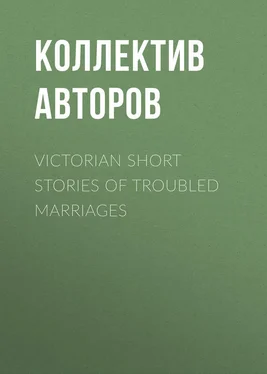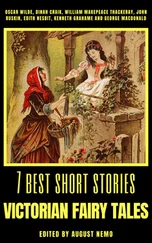Коллектив авторов - Victorian Short Stories of Troubled Marriages
Здесь есть возможность читать онлайн «Коллектив авторов - Victorian Short Stories of Troubled Marriages» — ознакомительный отрывок электронной книги совершенно бесплатно, а после прочтения отрывка купить полную версию. В некоторых случаях можно слушать аудио, скачать через торрент в формате fb2 и присутствует краткое содержание. Жанр: foreign_antique, foreign_prose, на английском языке. Описание произведения, (предисловие) а так же отзывы посетителей доступны на портале библиотеки ЛибКат.
- Название:Victorian Short Stories of Troubled Marriages
- Автор:
- Жанр:
- Год:неизвестен
- ISBN:нет данных
- Рейтинг книги:4 / 5. Голосов: 1
-
Избранное:Добавить в избранное
- Отзывы:
-
Ваша оценка:
- 80
- 1
- 2
- 3
- 4
- 5
Victorian Short Stories of Troubled Marriages: краткое содержание, описание и аннотация
Предлагаем к чтению аннотацию, описание, краткое содержание или предисловие (зависит от того, что написал сам автор книги «Victorian Short Stories of Troubled Marriages»). Если вы не нашли необходимую информацию о книге — напишите в комментариях, мы постараемся отыскать её.
Victorian Short Stories of Troubled Marriages — читать онлайн ознакомительный отрывок
Ниже представлен текст книги, разбитый по страницам. Система сохранения места последней прочитанной страницы, позволяет с удобством читать онлайн бесплатно книгу «Victorian Short Stories of Troubled Marriages», без необходимости каждый раз заново искать на чём Вы остановились. Поставьте закладку, и сможете в любой момент перейти на страницу, на которой закончили чтение.
Интервал:
Закладка:
'You don't really mean to say you are a tailoress?' said Willoughby, with a sort of eager compassion.
'I do, though! An' I've bin one ever since I was fourteen. Look at my fingers if you don't b'lieve me.'
She put out her right hand, and he took hold of it, as he was expected to do. The finger-ends were frayed and blackened by needle-pricks, but the hand itself was plump, moist, and not unshapely. She meanwhile examined Willoughby's fingers enclosing hers.
'It's easy ter see you've never done no work!' she said, half admiring, half envious. 'I s'pose you're a tip-top swell, ain't you?'
'Oh, yes! I'm a tremendous swell indeed!' said Willoughby, ironically. He thought of his hundred and thirty pounds' salary; and he mentioned his position in the British and Colonial Banking house, without shedding much illumination on her mind, for she insisted:
'Well, anyhow, you're a gentleman. I've often wished I was a lady. It must be so nice ter wear fine clo'es an' never have ter do any work all day long.'
Willoughby thought it innocent of the girl to say this; it reminded him of his own notion as a child – that kings and queens put on their crowns the first thing on rising in the morning. His cordiality rose another degree.
'If being a gentleman means having nothing to do,' said he, smiling, 'I can certainly lay no claim to the title. Life isn't all beer and skittles with me, any more than it is with you. Which is the better reason for enjoying the present moment, don't you think? Suppose, now, like a kind little girl, you were to show me the way to Beacon Point, which you say is so pretty?'
She required no further persuasion. As he walked beside her through the upland fields where the dusk was beginning to fall, and the white evening moths to emerge from their daytime hiding-places, she asked him many personal questions, most of which he thought fit to parry. Taking no offence thereat, she told him, instead, much concerning herself and her family. Thus he learned her name was Esther Stables, that she and her people lived Whitechapel way; that her father was seldom sober, and her mother always ill; and that the aunt with whom she was staying kept the post-office and general shop in Orton village. He learned, too, that Esther was discontented with life in general; that, though she hated being at home, she found the country dreadfully dull; and that, consequently, she was extremely glad to have made his acquaintance. But what he chiefly realized when they parted was that he had spent a couple of pleasant hours talking nonsense with a girl who was natural, simple-minded, and entirely free from that repellently protective atmosphere with which a woman of the 'classes' so carefully surrounds herself. He and Esther had 'made friends' with the ease and rapidity of children before they have learned the dread meaning of 'etiquette', and they said good night, not without some talk of meeting each other again.
Obliged to breakfast at a quarter to eight in town, Willoughby was always luxuriously late when in the country, where he took his meals also in leisurely fashion, often reading from a book propped up on the table before him. But the morning after his meeting with Esther Stables found him less disposed to read than usual. Her image obtruded itself upon the printed page, and at length grew so importunate he came to the conclusion the only way to lay it was to confront it with the girl herself.
Wanting some tobacco, he saw a good reason for going into Orton. Esther had told him he could get tobacco and everything else at her aunt's. He found the post-office to be one of the first houses in the widely spaced village street. In front of the cottage was a small garden ablaze with old-fashioned flowers; and in a large garden at one side were apple-trees, raspberry and currant bushes, and six thatched beehives on a bench. The bowed windows of the little shop were partly screened by sunblinds; nevertheless the lower panes still displayed a heterogeneous collection of goods – lemons, hanks of yarn, white linen buttons upon blue cards, sugar cones, churchwarden pipes, and tobacco jars. A letter-box opened its narrow mouth low down in one wall, and over the door swung the sign, 'Stamps and money-order office', in black letters on white enamelled iron.
The interior of the shop was cool and dark. A second glass-door at the back permitted Willoughby to see into a small sitting-room, and out again through a low and square-paned window to the sunny landscape beyond. Silhouetted against the light were the heads of two women; the rough young head of yesterday's Esther, the lean outline and bugled cap of Esther's aunt.
It was the latter who at the jingling of the doorbell rose from her work and came forward to serve the customer; but the girl, with much mute meaning in her eyes, and a finger laid upon her smiling mouth, followed behind. Her aunt heard her footfall. 'What do you want here, Esther?' she said with thin disapproval; 'get back to your sewing.'
Esther gave the young man a signal seen only by him and slipped out into the side-garden, where he found her when his purchases were made. She leaned over the privet-hedge to intercept him as he passed.
'Aunt's an awful ole maid,' she remarked apologetically; 'I b'lieve she'd never let me say a word to enny one if she could help it.'
'So you got home all right last night?' Willoughby inquired; 'what did your aunt say to you?'
'Oh, she arst me where I'd been, and I tolder a lotter lies.' Then, with a woman's intuition, perceiving that this speech jarred, Esther made haste to add, 'She's so dreadful hard on me. I dursn't tell her I'd been with a gentleman or she'd never have let me out alone again.'
'And at present I suppose you'll be found somewhere about that same stile every evening?' said Willoughby foolishly, for he really did not much care whether he met her again or not. Now he was actually in her company, he was surprised at himself for having given her a whole morning's thought; yet the eagerness of her answer flattered him, too.
'Tonight I can't come, worse luck! It's Thursday, and the shops here close of a Thursday at five. I'll havter keep aunt company. But tomorrer? I can be there tomorrer. You'll come, say?'
'Esther!' cried a vexed voice, and the precise, right-minded aunt emerged through a row of raspberry-bushes; 'whatever are you thinking about, delayin' the gentleman in this fashion?' She was full of rustic and official civility for 'the gentleman', but indignant with her niece. 'I don't want none of your London manners down here,' Willoughby heard her say as she marched the girl off.
He himself was not sorry to be released from Esther's too friendly eyes, and he spent an agreeable evening over a book, and this time managed to forget her completely.
Though he remembered her first thing next morning, it was to smile wisely and determine he would not meet her again. Yet by dinner-time the day seemed long; why, after all, should he not meet her? By tea-time prudence triumphed anew – no, he would not go. Then he drank his tea hastily and set off for the stile.
Esther was waiting for him. Expectation had given an additional colour to her cheeks, and her red-brown hair showed here and there a beautiful glint of gold. He could not help admiring the vigorous way in which it waved and twisted, or the little curls which grew at the nape of her neck, tight and close as those of a young lamb's fleece. Her neck here was admirable, too, in its smooth creaminess; and when her eyes lighted up with such evident pleasure at his coming, how avoid the conviction she was a good and nice girl after all?
He proposed they should go down into the little copse on the right, where they would be less disturbed by the occasional passer-by. Here, seated on a felled tree-trunk, Willoughby began that bantering, silly, meaningless form of conversation known among the 'classes' as flirting. He had but the wish to make himself agreeable, and to while away the time. Esther, however, misunderstood him.
Читать дальшеИнтервал:
Закладка:
Похожие книги на «Victorian Short Stories of Troubled Marriages»
Представляем Вашему вниманию похожие книги на «Victorian Short Stories of Troubled Marriages» списком для выбора. Мы отобрали схожую по названию и смыслу литературу в надежде предоставить читателям больше вариантов отыскать новые, интересные, ещё непрочитанные произведения.
Обсуждение, отзывы о книге «Victorian Short Stories of Troubled Marriages» и просто собственные мнения читателей. Оставьте ваши комментарии, напишите, что Вы думаете о произведении, его смысле или главных героях. Укажите что конкретно понравилось, а что нет, и почему Вы так считаете.

![Коллектив авторов - Best Short Stories [С англо-русским словарем]](/books/26635/kollektiv-avtorov-best-short-stories-s-anglo-thumb.webp)










